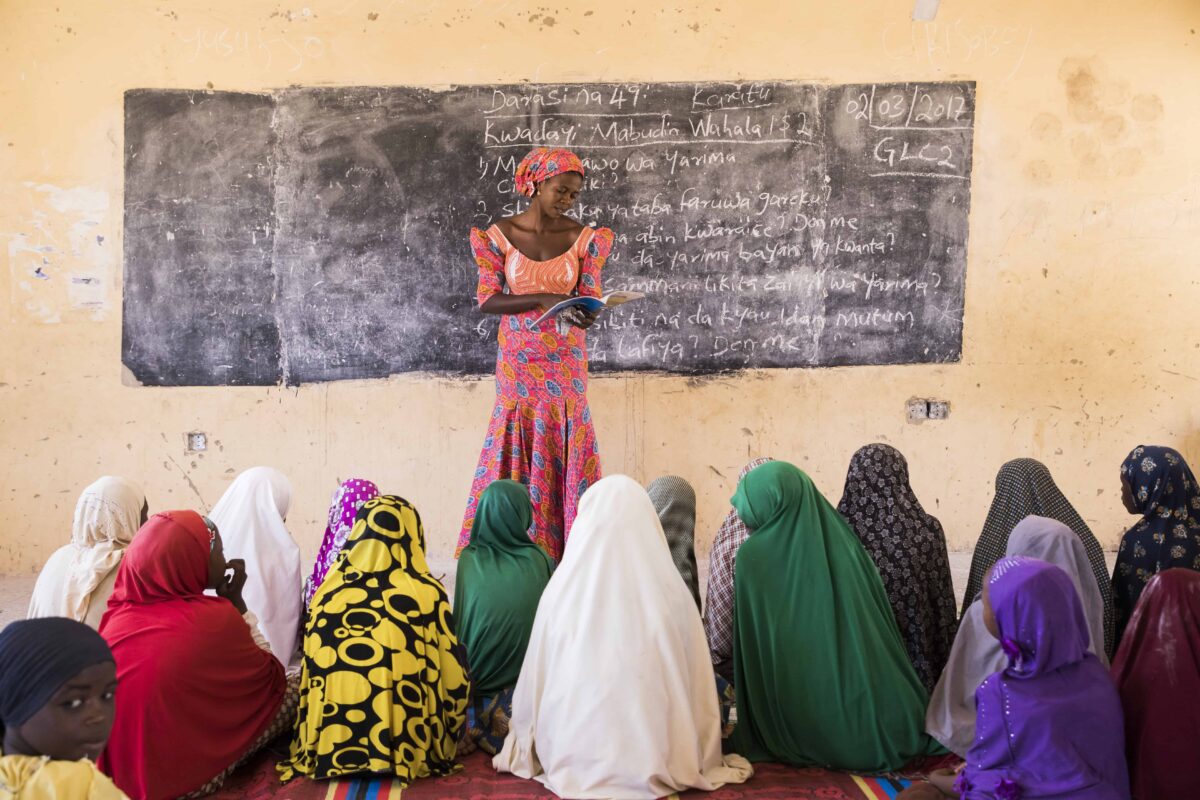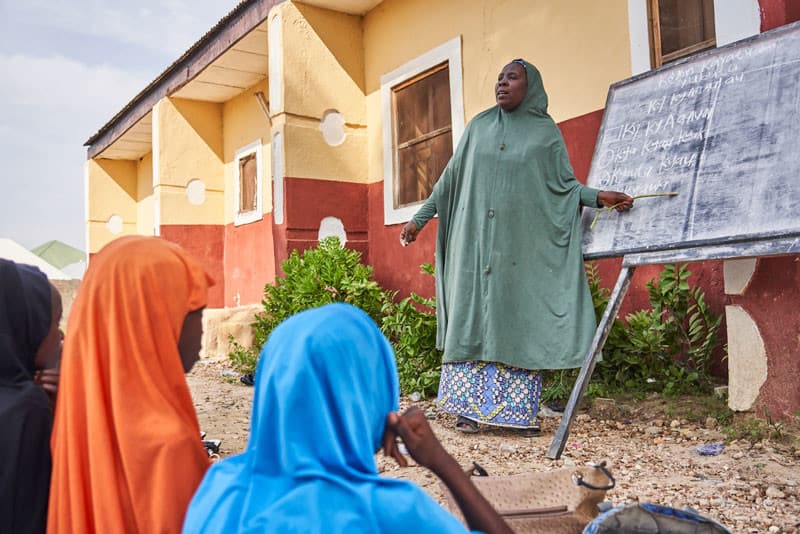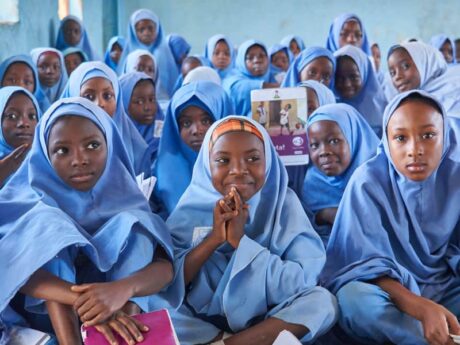Sokoto, NigeriaState officials have expanded the successful training, coaching and early grade materials of the Northern Education Initiative Plus to an additional 13 local government areas not covered by the project, making it officially a statewide program.
This expansion follows the success of the U.S Agency for International Development-funded Northern Education Initiative Plus early grade reading program, which trained approximately 7,000 teachers in 2016 on its Let’s Read! (Mu Karanta! in the local language of Hausa) curriculum.
Working closely with the government, the program also distributed more than 4 million reading textbooks to students and teachers, improving basic literacy skills for 400,000 children in Bauchi and Sokoto states.
Commissioner for Basic and Secondary Education Professor Aishatu Madawaki Isa says having more children gain basic literacy skills remains a priority for state government.
“We have decided to adopt the Northern Education Initiative Plus reading model because it helps build a strong foundation for our children. Our intention remains to cover every school, every child and every teacher with the Let’s Read! Mu Karanta! Program,” Isa says.
Improving education quality through professional development and new materials
A key piece of this expansion is additional teacher training. The Sokoto state government will provide a unique professional development opportunity for 1,350 teachers to grow into their roles as reading teachers to young learners.
This latest teacher training expanded the program’s reach and ensure more teachers have the materials and support to successfully educate young learners.
Many schools in Sokoto state are overcrowded, with student-teacher ratios of 100 — or more — to one. The quality of teaching is also a cause for concern. Many teachers have not had access to in-service training since taking up their posts.
Thanks to the expansion of the Let’s Read! Mu Karanta! Program, this is all about to change.
One of the teachers to join the new cohort of trainees in Sokoto state is Safiya Usman. Usman comes from a family of teachers, including both her grandparents and parents, but neither family experience nor her initial teacher training fully prepared her to handle a class of over 100 pupils.
This will be her first training in four years of teaching.
“This training is useful because I have learned different child-friendly approaches to engage the learners,” says Usman. “I can also put them in groups and engage them in several activities with songs, stories and the use of flash cards.”
In her third-grade class, Usman says there are hardly any students who can read or write in Hausa and English fluently. This is poised to change with the introduction of new teacher guidance materials for pre-planned lessons, as well as reading and writing workbooks to support learners.
“These materials provide children with opportunities to practice reading, listening and writing every day. The illustrations and stories are also very relevant, and if I follow the lessons, I should see improvement in my pupils,” she says.
Building on early grade reading success
Findings of the recent early grade reading assessment conducted in 2018 indicated a significant improvement in reading outcomes among learners in both Bauchi and Sokoto states, where the Let’s Read! Mu Karanta! program operates. Grade 3 learners in particular showed a marked improvement in their ability to read and understand grade-level text following the first three years of this five-year program.
Based on these gains and the warm reception the program has received from learners, parents and teachers, the Sokoto state government decided to replicate and extend the early grade reading program to schools in 13 other local governments not covered by the Northern Education Initiative Plus, making it a statewide program.
The Sokoto government is working to meet commitments made in a five-year memorandum of understanding signed with USAID to support basic education.
Guiding teachers to success in the classroom
In a state where conditions are challenging for learners and their families, there is renewed excitement as teachers learn new techniques for developing learners’ reading skills.
For many teachers, having a guide where all lessons are scripted for the whole school year is a welcome addition to their classroom work. Each teacher’s guide contains daily lessons in reading and writing, in English and in Hausa, which provide activities and step-by-step instructions to support effective teaching. The Let’s Read! Mu Karanta! teacher’s guide helps teachers integrate reading activities in a way that provides pupils with a rich and well-structured learning experience.
The lessons contain songs, stories and encourage the use of flash cards, charts and posters to explain concepts, such as how to teach letters and sounds in English.
Abdullahi Omeji from the Bodinga local government says the teacher’s guide will help him prepare adequately for his class.
“It is clear what the objective for each lesson is, what materials I could use to teach sounds and letters and how I can guide the pupils to learn effectively with the songs and stories,” he says.
In 2016, USAID’s Northern Education Initiative Plus developed 750 lessons in Hausa and English for Let’s Read! Mu Karanta! while partnering with more than 100 international and local curriculum developers, linguists, primary school teachers and other educators.
The United Nations International Children’s Emergency Fund has adopted the reading program and materials to train additional teachers on early grade reading, working in local governments in Bauchi and Sokoto that are not covered by the program.
Year-round support through coaching and mentoring
Beyond the training, teachers require support and supervision at the schools to continue learning and growing through exchanges with peers and supervisors.
The Northern Education Initiative Plus coaching and mentoring model provides these opportunities for teachers by training school support officers in early grade reading to conduct regular classroom observations and provide feedback to help the teachers to improve.
Sokoto state government adopted this coaching and mentoring system in its own yearly planning. Teacher trainers who lead trainings in the 13 expansion local government areas are school support officers. These school support officers received five days’ training to not only train teachers, but also to provide coaching and mentoring support on a regular basis.
Lubabatu Mohammed was a teacher for almost 20 years before transferring to the Sokoto North Local Government Education Authority as a school support officer. She is one of the 104 teacher trainers selected to train the teachers in the expansion areas. She says the skills she gains will also be useful for classroom observations when she visits schools.
“Now I know what to look out for when I visit a school and observe a teacher teaching early grade reading. I want to see how the teacher follows the sequential steps in the lesson, interaction with learners, use of teaching aids, pronunciation of sounds and pupil practice time,” Lubabatu says.
In all, the state has distributed early grade reading materials, trained teachers and supported school monitoring and supervision with an investment of $497,000 in 2018.



